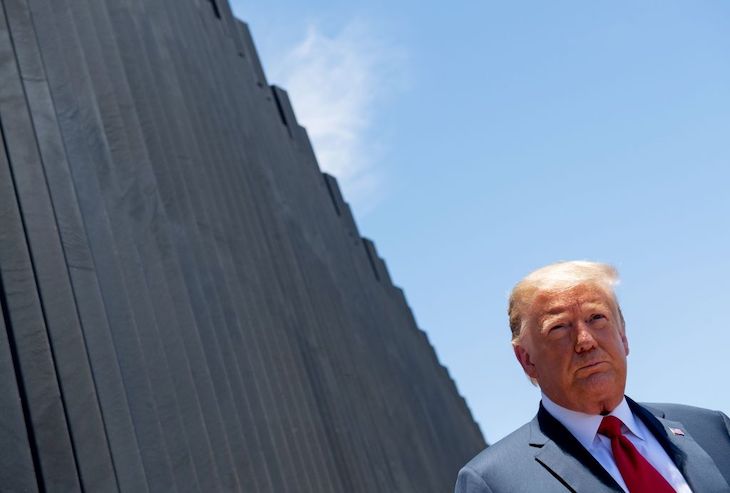Donald Trump has said he would not rule out military action against Mexico’s narco-cartels which he blames for the opioid crisis killing astronomical numbers of Americans. ‘Mexico’s gonna have to straighten it out really fast, or the answer is absolutely. They’re killing 300,000 people a year with fentanyl coming in,’ he told Fox News host.
The narcos are invisible, deeply embedded within their communities
This isn’t the first time Trump has talked tough when it comes to drugs. The former and possible future president has mulled deploying commando teams to take out the narco godfathers bin Laden-style. He has also weighed up putting Mexico under naval embargo.
Trump also isn’t the the only Republican to bang the drums of war in recent years. Last January, Dan Crenshaw of Texas introduced a bill authorising armed strikes against fentanyl importers. Another bill put forward by Republican Lindsey Graham would have classed narcos as terrorist organisations and fentanyl as a chemical weapon, while previous presidential candidate Vivek Ramaswamy called on ‘our military to annihilate the Mexican drug cartels and finally end the supply-driven fentanyl crisis.’
It’s true that much of the fentanyl in the US originates in Mexico. The Mexicans source the ingredients from China and process the product in clandestine laboratories, before dispatching it to safehouses across America. Mexico, one of America’s top trading partners, has a long, proud tradition of standing up to the gringos, and will not take any breaches of their sovereignty lightly. But can boots on the ground actually work?
Every self-respecting Mexican crime boss wields their own paramilitary militia: the Jalisco Cartel in particular like to parade their goons in masks with automatic weapons and riding ‘narco-tanks’ (homemade armoured vehicles) in a show of force. But, for the most part, Mexican drug dealers aren’t standing around in uniform. The US military is great at fighting conventional wars; insurgents, not so much. Like the Taliban or Vietcong, two other opponents the US war machine has struggled with, the narcos are invisible, deeply embedded within their communities.
They’re also closely intertwined with the establishment: you can’t simply liquidate a gang of bandits hiding out in the mountains and claim victory when mayors, ministers and generals are in on it. Historically, police chiefs and politicians have been known to take a cut of the action: in the case of Baja California governor Esteban Cantú, even using the profits to subsidise infrastructure projects and schools. To the extent the Mexican authorities do fight drugs and organised crime, it can be better seen as clearing out competitors.
Neither can you win by removing the leaders. Last week, Ismael ‘El Mayo’ Zambada was caught in a sting luring him on a private jet to Texas. El Mayo was considered the Sinaloa Cartel’s mastermind lurking in the shadows (unlike El Chapo, he didn’t sit down for interviews with Rolling Stone) and possibly the most powerful narcotrafficker on Earth. However, while the term ‘cartel’ is frequently used by American prosecutors to name and shame drug peddlers, it doesn’t quite describe how these gangs operate. The Sinaloa Cartel can be better-described as the Sinaloa Federation: a loose network of traffickers, some with greater reach than others, who sometimes collaborate or ally against rivals like the Jalisco boys.
So, Trump’s kingpin strategy will only lead to more bloodshed. In 2006, then-president Felipe Calderón declared a war on drugs, deploying soldiers, special forces and helicopters (courtesy of the United States) to capture or liquidate crime bosses. Mighty narco empires crumbled into smaller, warring kingdoms, turning Mexico into the bloody mess it is today. Intensifying violence will also send refugees flooding over the border, something nobody wants.
Americans want drugs, and if the Mexicans can’t sell them, somebody else will
Blaming Mexico ignores the United States’ role in the crisis. Washington has poured money and resources into counternarcotics south-of-the-border which end up in the pockets of the narcos’ allies, the security forces. The Zetas, one of Mexico’s bloodthirstiest gangs, were initially made up of ex-special forces commandos trained at the infamous School of the Americas at Fort Bragg.
Meanwhile, the same cars ferrying dope across the Rio Grande bring back guns the other way. Each year hundreds of thousands of high-calibre firearms flow into Mexico, enough to equip several armies – which the Republicans have no intention of stopping.
‘At least 80 per cent of the weapons that go into Mexico come from the United States,’ the DEA’s former chief of international operations Mike Vigil told me. ‘We estimate that amounts to about 300,000 weapons flowing across the border on an annual basis, a lot of which are military-grade weapons that end up in the hands of criminals. The Republican party has refused to come up with a solid gun control law because they are in the pockets of the National Rifle Association.’
The war on drugs also consistently misunderstands the nature of supply-and-demand. Americans want drugs, and if the Mexicans can’t sell them, somebody else will: before Mexico, most of America’s opioids came from the Italian Mafia and their French and Middle Eastern partners. Disrupting the supply chain will create an even more chaotic, poisonous drug market in the States: as recent studies show, removing established dealers merely replaces them with up-and-comers whose product is less reliable, and therefore deadlier.
So while Trump talks a good game on cracking down on drugs, he’d be wise to think twice about following through on his threats if he does become president.







Comments